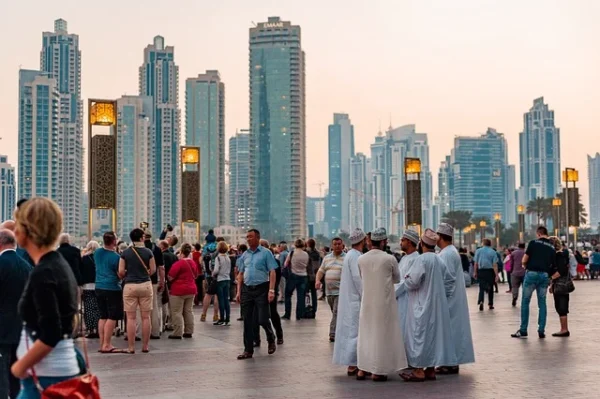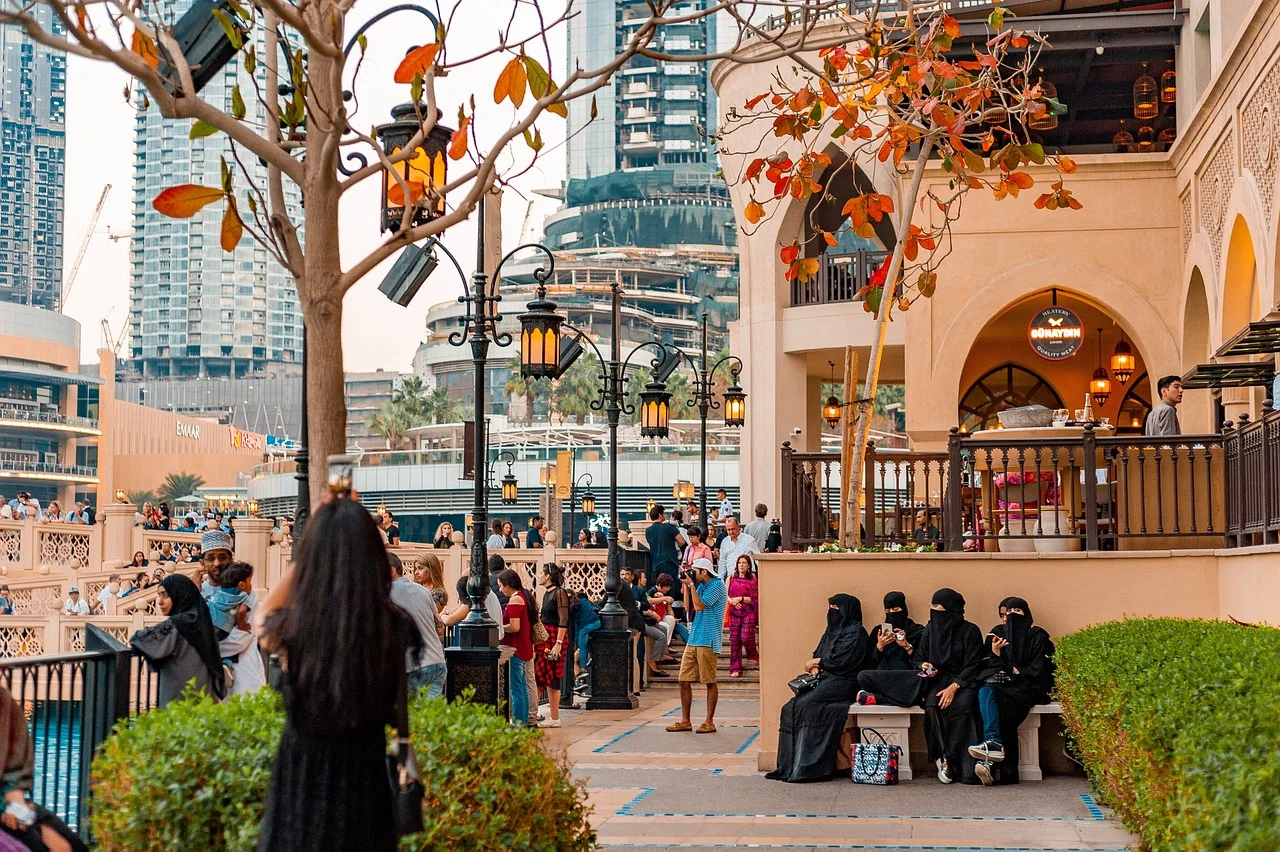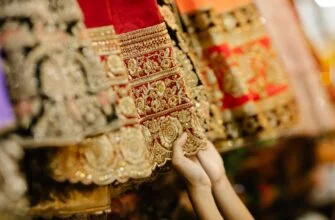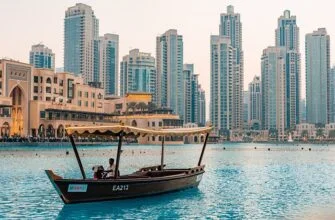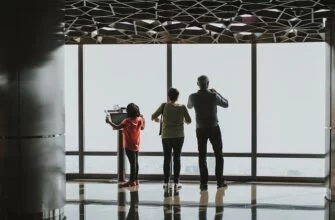Extreme Dubai’s heat! Longing to put on something light, transparent, and very short…
But wait, do you know for sure that you do not need to make some adjustments to your wardrobe while in Dubai?
Knowing the dressing norms in the UAE for tourists is crucial for avoiding unwanted attention.
To learn more about the “fashion look” of this lively city, check out our extensive guide to the Dubai Dress Code.
- Does Dubai Have a Dress Code?
- Why Respecting Local Customs Matters
- Dressing Modestly in Dubai: Guidelines for Men and Women
- Dress Code for Men in Dubai
- Dress Code for Women in Dubai
- Dubai Dress Code during Ramadan
- Beyond the Basics: Additional Tips for Dressing in Dubai
- Consider the Climate
- Summer (April to September)
- Winter (October to March)
- Transitional seasons (March-April and October-November)
- Packing for Different Activities
- Hotel Pools and Beaches
- Upscale Restaurants or Nightclubs
- Safari
- Mosques
- Malls
- Other Emirates
- FAQs on the Dubai Dress Code
Does Dubai Have a Dress Code?
Despite its strict social standards and Islamic traditions, the United Arab Emirates does not have a formal dress code for visitors.
The city is full of tourists and expats and everybody got used to the way they usually dress.
However, to respect the local culture, for ladies, it’s best to choose modest clothing: cover the shoulders and dress down to the knees.
For males, cover the chest and shoulders and opt for longer pants and shorts. Additionally, it will protect you from sunburns.
There are more flexible and detailed guidelines that we note in the following sections. (i.e. Dressing Modestly in Dubai: Guidelines for Men and Women).
Dubai is the best illustration of the flexibility, being the most tourist-friendly city in the entire country. It is anticipated that visitors to the UAE will observe decency norms.
So the best plan to follow is to keep in mind the meaning of modesty and apply it appropriately to your clothing.
Why Respecting Local Customs Matters
Many visitors to the UAE are not aware of the public order regulations in the area. Nonetheless, to have a seamless and joyful experience, “you’ve got to play the game according to the local rules”.
Following them not only demonstrates genuine respect for the locals and helps tourists feel at ease and confident among them, but it also helps prevent needless police warnings.
However, most of the time, the worst thing that could happen is that the police only give violators a warning and tell them that they have to change clothing.
Signs indicating the proper dress code have been put up in public places across the city in reaction to the rules’ noncompliance.
Nonetheless, the locals think that there should be harsher penalties for such behavior and are less tolerant of foreigners – but they rarely criticize verbally, mostly giving the stink eye. That’s why respecting UAE’s customs is the best way to guarantee a safe and fun getaway.
Dressing Modestly in Dubai: Guidelines for Men and Women
Dress Code for Men in Dubai
The following advice may help you appear respectable while still feeling at ease and fashionable:
- It is preferable to wear long pants, shirts, and sleeved T-shirts in most public spaces, including malls, museums, and cafes.
- Avoid clothes with provocative patterns or slogans, as well as shirts with no sleeves and extra short or slinky shorts.
- Shorts (preferably longer ones) and modest swimwear are fine at the beach or pool, whereas being nude is forbidden.
- A more formal dress requirement, such as trousers and a collared shirt, could be necessary for luxury restaurants and clubs.
- Sandals are appropriate for casual events, and closed shoes are advised for formal ones.
- If you plan to visit Abu Dhabi’s Sheikh Zayed Grand Mosque or Dubai’s Jumeirah Mosque, remember that men must wear long trousers and a shirt with sleeves (preferably long-sleeved).
Dress Code for Women in Dubai
Women have a wide choice of clothes to go out in style, but at the same time respecting the rules of decency.
- Choosing long dresses, skirts, or loose pants is advised to cover the knees and shoulders.
- Don’t dress provocatively, for instance, wearing mini-shorts or skirts, or low-cut tops.
- It’s appropriate to wear short shorts, skirts, strapless tops, and low necklines at hotels (where most vacationers stay), on the beach, or at the pool (ideally a hotel pool).
- It is crucial to keep in mind that wearing some clothing may not allow you to enter the mosque. Wearing abayas or scarves when visiting places of worship is another way to demonstrate respect.
Note! An abaya is a long, loose-fitting dress that leaves the head uncovered. The most popular choice for Gulf women’s attire. The traditional choice is to wear an abaya with a sheila or hijab. A woman puts her head through a hood called a hijab.
The headwear that is mistaken for a hijab is called a sheila. It covers the hair and wraps around the head like a shawl. While the neck may not always remain open, the face does.
Dubai Dress Code during Ramadan
Tourists are advised by the authorities to dress conservatively, but there is no official dress code for non-Muslim visitors at this time. It’s recommended to opt for longer clothing and avoid skin-tight or revealing garments. It is also disrespectful to wear transparent clothing.
Choosing natural makeup rather than vivid ones is also advised.
The greatest option for males is to cover their shoulders and choose long pants.
Beyond the Basics: Additional Tips for Dressing in Dubai
Consider the Climate
Summer (April to September)
- Temperature: High humidity, temperatures may exceed 40°C.
- Clothing Tips: Choose breathable fabrics like linen or cotton and wear loose-fitting clothes such as flowy dresses and wide-leg pants to stay cool. Don’t forget to use sunscreen, hats, and sunglasses to prevent sunburn suffering.
Winter (October to March)
- Temperature: Ranges from 23°C to 32°C, with cooler evenings.
- Clothing Tips: Pack both short and long-sleeve tops for changing weather, and include a thin sweater or cardigan for chilly evenings. A warm jacket will also come in handy for desert cafe visits at night.
Transitional seasons (March-April and October-November)
- Features: These months offer warm and comfortable weather as they transition from intense summer heat to winter relaxation. Throughout March and April, daytime highs of up to 32°C are seen by midday, with evenings staying cool at about 20°C. October and November saw lows of 20–22°C at night and highs of no more than 35°C during the day.
- Clothing Tips: It’s smart to wear clothes that you can layer so you can adjust to the temperature changes during the day. And don’t forget to bring hats, caps, or bandanas when you’re outside, even if it’s not very hot.
Packing for Different Activities
It is impossible to imagine a Dubai vacation without visiting upscale dining venues, nightclubs or educational excursions, and huge shopping centers. For each activity and place, we have selected rules for choosing clothes for you.
Hotel Pools and Beaches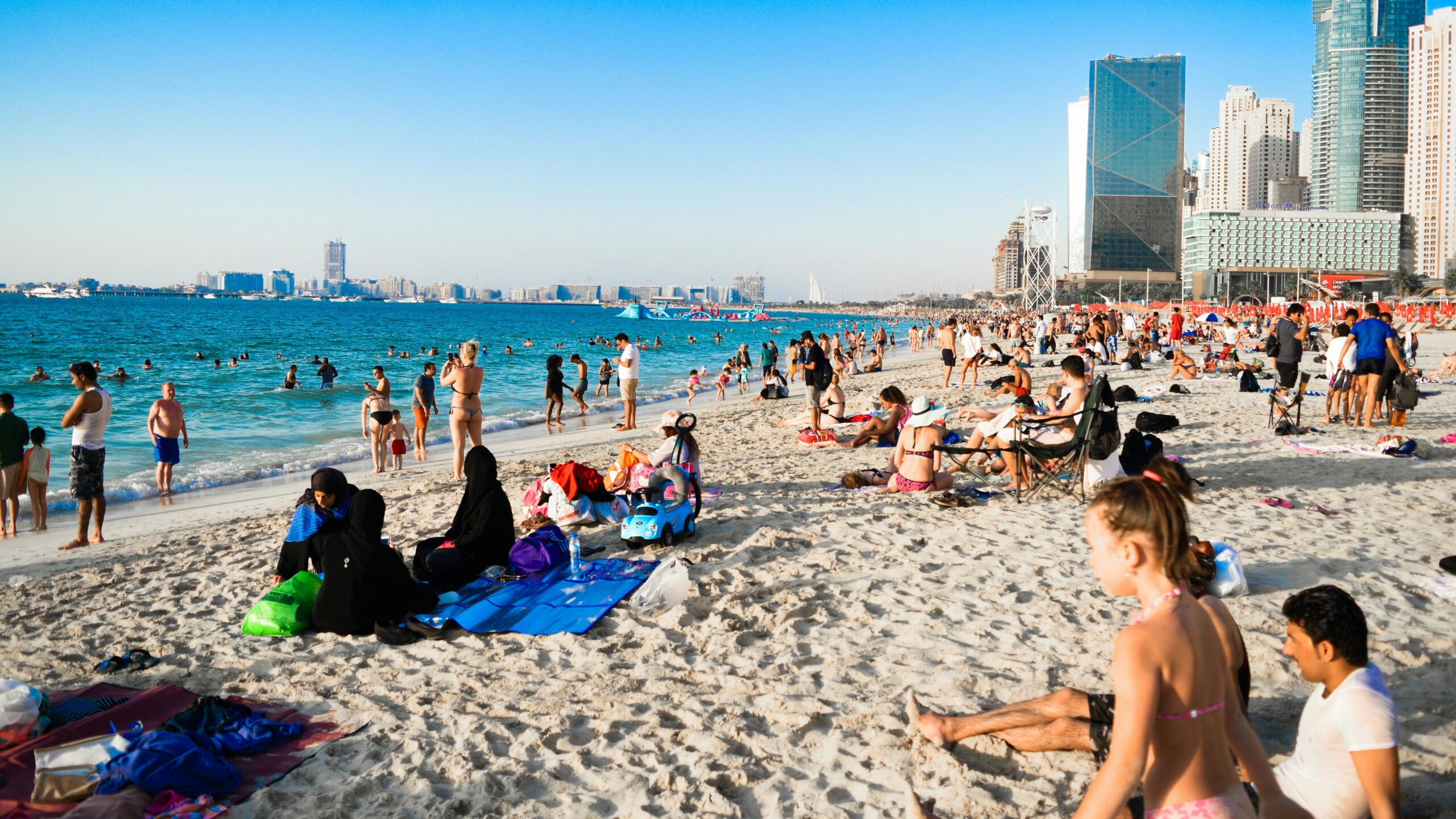
- Swimwear: Within designated beach and pool premises, swimsuits and bikinis are allowed.
- Cover-ups: When moving to and from these places, it’s best to wear a cover-up or casual clothing.
Only on Sharjah’s city beaches, wear one-piece swimsuits, pareos, and other cover-ups to prevent drawing unwanted attention.
Note! Nudism is completely forbidden in the UAE.
Upscale Restaurants or Nightclubs
As in public spaces, where proper clothing should be worn with respect for the rules of a Muslim country, the same regulations apply to casual dining at cafés and restaurants.
A smart casual/smart chic/smart elegant dress code is in effect, though, as a sort of “face control” for upscale dining venues and nightclubs:
- Men: Suitable clothing consists of a tuxedo, pantsuit, long-sleeved shirt фтв trousers, and boots (for specific rules, it’s best to check the venue’s website beforehand). Avoid jeans, t-shirts with short sleeves, and sports shoes.
- Ladies: Dress elegantly; generally speaking, avoid cleavage and back cutouts that display too much skin.
Note! Wearing high heels anywhere is normally permitted, and there are no strict shoe regulations for ladies. However, wearing shoes that cover your toes is preferable.
Safari
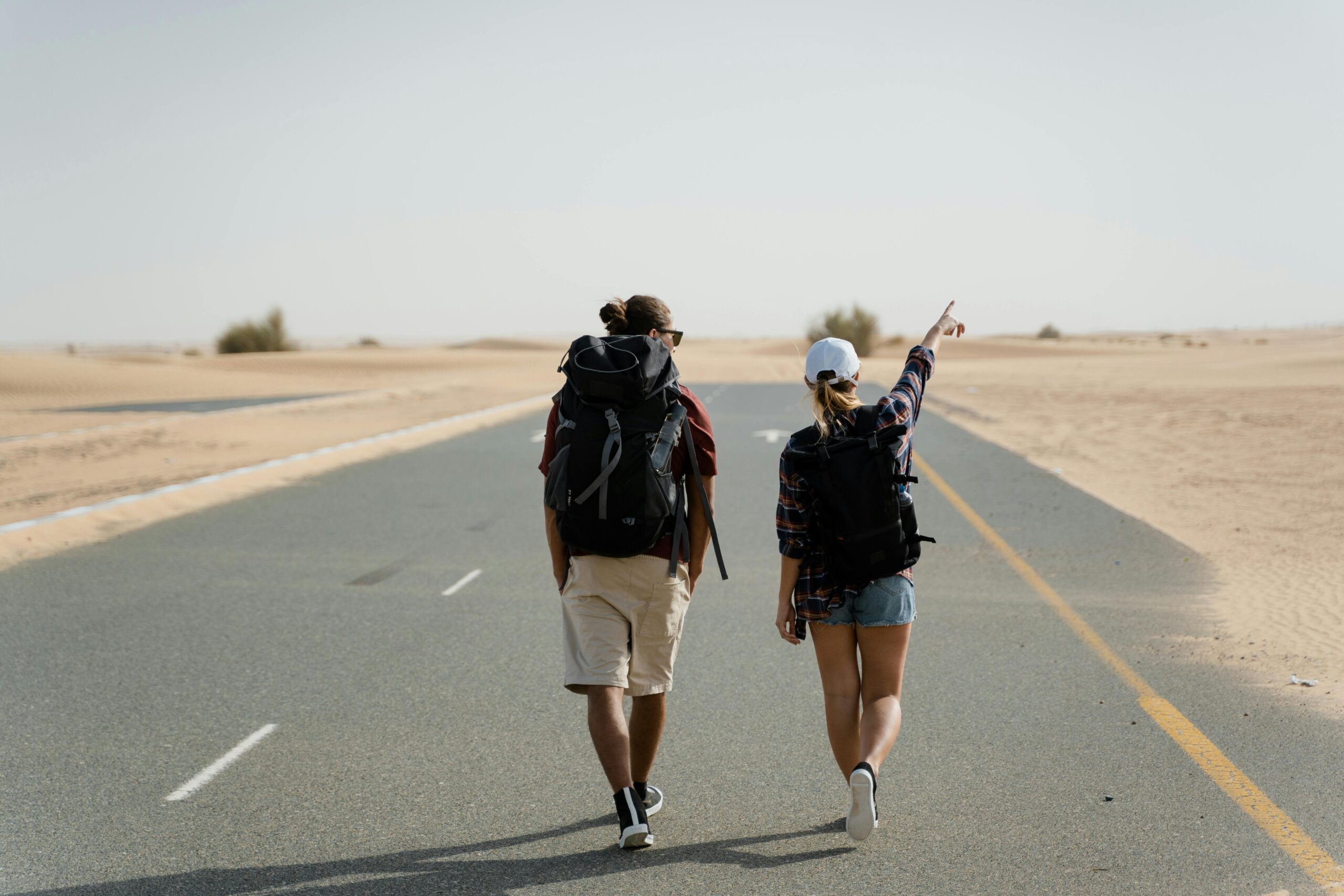 It’s crucial to dress comfortably and protectively if you intend to go on a desert safari.
It’s crucial to dress comfortably and protectively if you intend to go on a desert safari.
Examples of such attire are capris, shorts, and trousers. It could be uncomfortable to wear dresses, short shorts, tunics, and skirts. When walking on the dunes, choose shoes that fit tightly and are comfortable to prevent injuries.
Remember to bring necessary protection accessories, such as hats and sunglasses.
If you want to avoid getting sand in your mouth, nose, or eyes, think about packing a keffiyeh or bandanas.
For exploring the desert, a backpack is advised rather than a bag. It makes carrying stuff you might not need right away easier and is more practical for activities like hiking, sandboarding, and riding camels.
If you plan to stay overnight at a campsite, it is better not to forget thermal underwear (especially in winter), a windbreaker, woolen socks, gloves, and a scarf. Usually, the night is spent in a Bedouin camp, where the stone construction keeps the structures warm inside. Mostly, warm clothing is required for gatherings around the fire for dinner and at night.
Kids’ attire ought to match their parents’ comfort level; this includes breathable, light-weight long-sleeve clothes, leggings, long breeches, loose pants, closed-toe shoes, a headscarf, or a wide-brimmed hat. Glass-lensed, dark sunglasses are also advised.
Mosques
It’s crucial to follow Islamic dress codes when entering mosques and other places of worship.
Here are a few general suggestions:
- The key is modesty.
- For women: wear loose skirts or pants that do not show the ankles, long sleeves that cover the arms to the hands, and headscarves or abayas that make you keep hair away from prying eyes.
- For men: choose long trousers and shirts with long sleeves.
Malls
It is imperative to comply with modest clothing regulations, particularly while visiting more conservative districts.
Elbows and knees should often be covered, according to the dress code.
Bringing a light stole is also advised, as they come in extremely handy, particularly in malls where strong air conditioning systems may make the environment rather cold.
Those who are prone to cold readily tend to wear warmer clothing, like a cardigan or sweater, when they are in the mall.
Other Emirates
Since Sharjah is regarded as the most conservative emirate, visitors frequently ask about suitable clothing to avoid offending the residents.
Conventionally, the rules can be divided depending on two places: the rules on the territory of the hotel chosen by the tourist and the rules that apply in public places and other establishments in Sharjah.
In a hotel, you can feel relaxed by wearing shorts, T-shirts, and tops, but still be respectful and dress modestly in the lobby and other zones of the hotel where you may be seen by other guests.
Outside the hotel premises, the dress code stipulates that items of clothing must cover the torso (from the shoulders to below the knee) and must not be too tight, revealing, or contain any transparent materials.
In all other emirates the rules are no different from those that apply to Dubai.
FAQs on the Dubai Dress Code
Do I need to cover my head in Dubai?
Headscarves and abayas are not required outside of religious sites. However, it is advised to put on hat to prevent sunstroke due to weather conditions.
What to wear when visiting religious places?
Mosques have very strict rules related to clothes. It requires women to cover their arms and legs completely. In order to hide the hair, abayas or scarves are also necessary. For men, it is less strict, but still knees and shoulders must not be visible and have to be covered with shirts with long sleeves and pants.
Can I wear revealing clothing in Dubai?
Swimwear, shorts, tops that can be named revealing are only acceptable in certain areas, like swimming pools and beaches. It is crucial to follow the modesty concept in all other places.
Can I wear shorts in Dubai?
Yes, but we advise to choose longer options for public areas.
What about beachwear in public?
You cannot wear swimwear outside designated pool/beach areas. Donning swimwear, including bikinis, is available at hotel/pools/beaches, however, it is advisable to cover yourself when entering and exiting these locations.
Conclusion: Dressing with Confidence and Respect in Dubai
Generally, there are a lot of expats and tourists in Dubai, much more than locals, so actually, no one cares who wears what for a long long time.
But still, there are a few key things to consider while packing your travel clothing for Dubai:
- Respect for Islamic Traditions: Even though Dubai is a contemporary and stylish city, it’s important to respect Islamic customs especially when visiting public places and religious places. When you’re out try to choose the attire covering the knees and shoulders.
- Climate: Because of the scorching desert environment, choose airy, lightweight clothing that will keep you cool. But it is advised to take layers with you as it could be quite cold inside malls, cafes, amusement parks, etc due to AC.
- Cultural differences: Although clothing regulations in Dubai are more liberal than in surrounding emirates like Sharjah and Abu Dhabi, it’s still vital to be aware of these distinctions.
- Beach and Pool Attire: Wearing swimwear, such as shorts and bikinis, is permitted on Dubai’s beaches and hotel pools. Nudism lovers will not be able to relax naked or topless.
- Desert Exploration: Wearing protective clothes, such as capris and trousers, is advised if you intend to go into the desert.
- Versatility: Choose pieces that can be mixed and matched to create multiple outfits suitable for different occasions. Use accessories such as scarves and jewelry to add personal style and maintain modesty.
Following these rules will allow visitors to fully enjoy Dubai’s amazing sights while honoring local traditions and preventing any issues with dress codes.


